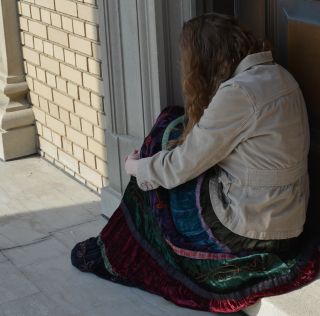Fear
Experiencing Paranoia With Schizophrenia
A Personal Perspective: I believed my family and friends had become my enemies.
Posted March 23, 2023 Reviewed by Michelle Quirk

Today, I live in a realistic world with a loving family, friends, and meaningful work. I enjoy performing on violin at church again and teaching piano lessons. I am financially stable, with money in my bank account. But I still remember a time years ago when I carried no money, had a depleted bank account, and believed my friends and family were, in fact, my enemies. I believed they would try to prevent me from changing the world.
A Loving and Supportive Childhood
When I was growing up, my family was loving and supportive. Living on five acres of beautiful, wooded land, my younger brother and I enjoyed playing in the forest. We spent the summers swimming in our above-ground pool, riding bikes, and playing with friends from the church where my dad served as pastor.
Throughout life, my parents have made many sacrifices to empower me in pursuing my dreams. When I was ready for first grade, both of my parents worked tirelessly to afford a private school close to our home. They also paid for my brother to attend the same school two years later when he turned 6. They enjoyed watching our interests and talents develop and supporting us in our endeavors.
I became quite passionate about the violin around age 13, devoting several hours each day to practicing. At that time, recognizing my hard work and love for the violin, my violin teacher worked with my parents to find me a more highly advanced teacher at the Cleveland Institute of Music, which was a 30-minute drive from our suburb of Cleveland. My skill and confidence grew under the instruction of this violin professor. I have warm memories of talking with my dad about politics and economics every week on our ride downtown for violin lessons. When I was about age 15, my parents bought me a professional violin, which was a significant financial stretch for them. They stood with me and encouraged me.
I am grateful that, when I was ready to attend college, my parents were willing and even seemed pleased to help me financially while I pursued my dream of becoming a medical professional and doing clinical trials in HIV or cancer.
Throughout my childhood, I was realistic, responsible, kind to the people around me, and enjoyed social gatherings. I was always busy, studying, or practicing the piano or my violin when I was not spending time with friends. At age 16, I took on a few violin students and was proud that I could do something I loved to make money.
Schizophrenia Unfolding
Upon graduating from high school, my life was unfolding in positive ways as I began college at the University of Southern California. Little did I know that that the neurobiological process of schizophrenia was unfolding in my mind. My personality began to change in a steady and increasing manner. After a few semesters, a had lost my grip on reality, believing that my grades did not matter anymore. I was unaware of these personality changes at the time and would later be amazed at them in hindsight.
Delusions came on slowly. Following a short trip to China, I became obsessed with returning there and making a powerful and meaningful impact, aiding people in poverty and coming up with ways to improve their lives. After my China trip, I should have reevaluated my goals—perhaps pursuing a Ph.D. in economics or political science and also taking advanced courses in Chinese. Since I planned to make an impact in China, I probably needed to live there for some time to sharpen my Chinese language skills and better acclimate to the culture, to develop a realistic plan.
None of these realistic goals even crossed my mind. I was convinced I could help millions of impoverished people and was certain that somehow, like a miracle, it would happen immediately. I believed that anyone who would think otherwise was, in fact, evil, and I became suspicious of my parents, expecting they would not approve and would stand against my new goals.
As my delusions grew stronger, I started to develop a greater suspicion of my family. I was convinced that it was OK for me to have declining grades. I worried they would not understand. It was at that time, summer of 2002, that I traveled to Nairobi, Kenya, for two months, volunteering in a slum area.
Before I dropped out of college, my parents had strongly expressed disapproval of a Thailand trip I was planning, which I believed I was directed to take by God. I was angry that my parents did not believe I was the most special person to walk the earth in the last 2,000 years. In fact, I cannot remember a time in my life when I was angrier than when they told me they did not support my plans to travel overseas for a third time in one year.
That same year, I did go to Thailand. On my return, I was unreasonable, jobless, and friendless. In my illness, I was unable to accept help. Rather than being in touch with people who loved me, who did not believe in my delusions, I preferred to hide away by sleeping outside and searching for food in the garbage.
I began recklessly spending money on international trips, including trips to Thailand, Hong Kong, and, later, England, convinced that seeing the world would help me on my journey to becoming a prophet. While overseas, I was taking dangerous risks, wandering into bad areas alone, unaware of the danger, and traveling without nearly enough money in my bank account to meet my needs.
Back in a Realistic World
Today, in 2023, due to effective medication, I live in a realistic world again. I am deeply grateful to have my loving family in my life, as well as many close friends. Through my work, I have not reached millions of people, but I have reached thousands of people with schizophrenia, like me, with educational resources and support through the work of the CURESZ Foundation.
My paranoia and delusions are completely gone now, and they have been for 16 years. My antipsychotic medication has changed my life (personally, I take clozapine, but patients’ needs vary widely). I am financially responsible, as I used to be in high school. I have left the delusions, anger, and paranoia behind.
Paranoia can devastate a young person’s life, interfering with work or academic goals, relationships, housing, and sometimes even length of lifespan. I didn’t play my beloved violin for four years while I was homeless.
Paranoia can be especially hard to treat, as patients often do not know anything is wrong, just like I believed I was well, and simply a special person. I did not consent to treatment at first. Today, I am truly grateful my treatment team insisted that I take medication, which gave me a second chance at life.




